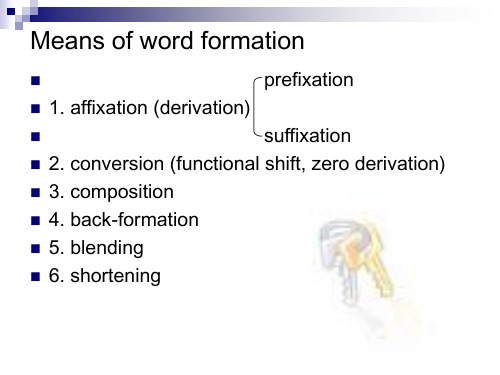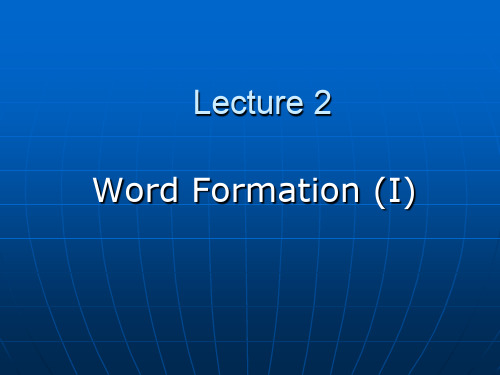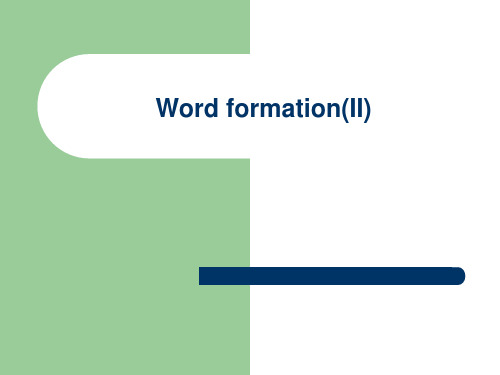- 1、下载文档前请自行甄别文档内容的完整性,平台不提供额外的编辑、内容补充、找答案等附加服务。
- 2、"仅部分预览"的文档,不可在线预览部分如存在完整性等问题,可反馈申请退款(可完整预览的文档不适用该条件!)。
- 3、如文档侵犯您的权益,请联系客服反馈,我们会尽快为您处理(人工客服工作时间:9:00-18:30)。
Word formation(II)
This unit deals with the major word-building to create new words in the English language. By studying this unit, learners are expected to
ing,-ism,-ship, -ant,-al, -ance,-ation, -ence,-ment,-ity,ness,-ist, -ite,-an, -ese,-ure,or,-cy,-y Adjective suffixes:-ed,-ant,-ful,-ish,-less,-like,-ly,-y,-al,esque,-ic,-ous,-able,-ative,-ive,-ise Verb suffixes;-ate,-en,-ify,-ize,-ise Adverv suffixes:-ly,-ward(s),-wise
4.2 Compounding(composition)
Definition and its major features New words are sometimes constructed by
the ending of a word to change its class or function. Suffixes can be classified into groups on a grammatical basis.
Table: the most productive suffixes to know Noun suffixes:-eer,-er,-ette,-let,-ster,-dom,-ery, -hood,-
4.1.2Suffixation
Definition and its major feature Suffixation is the formation of new words by
adding suffixes to stems. A suffix is a letter of a group of letters placed at
4.1.1 Prefixation is the formation of new words by
adding prefixes to bases (stems).
1Prefixes which are negative: a-, dis-, in-, non-, un2Reversative (逆向)or privative: de-, dis-, un3Prjorative:mal-,mis-,pseudo4Of degree or size: arch- extra, hyper-,macro-,micro-
3kinds of word formation
Add, borrowing, imitation, coinage, invention
Shorting: abbreviation (clipping, blending, initialization), backformation
Know the major word-building processes used to create new words in English
Be acquainted with commonly used morphemes
Be able to use the word formation knowledge to improve vocabulary learning
Neither adding nor shorting: conversion
4.1 Affixation (Derivation)
Definition and its major features Means the formation of new words by adding
affixes to other words or morphemes. eg, disagreement is derived from the verb agree by the addition of the dis- and the noun-forming suffix –ment. Affixation falls into two subcategories: prefixationand suffixation
,mini-,out-,over-, sub-,super-,sur-,ultra-,under 5of attitude: anti-,co-,contra-,counter-,pro-, 6locative:extra-,fore-,inter-,intra-,super-, tele-,trans-, 7of time and order: ex-,fore-,pre-,post-,re8of number:semi-, uni-,mono-,bi-,di-,tri-,multi-,poly9of conversion: a-, be-, en-, 10Of a miscellaneous:auto-,neo-,pan- proto-,vice-
As we can know from the above list, many suffixes are polysemantic, they have more than one meaning.for example, the demorminal suffixes –er has varied meanings,1) something having x, glover 2)inhavitant of x, londoner 3)maker of x, wheeler





